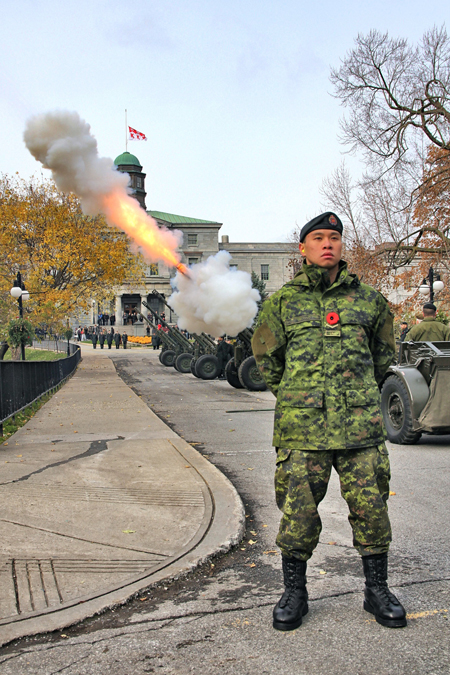The Students’ Society of McGill University (SSMU) has begun the hiring process for a new staff position that will investigate and report on research into military technology carried out in McGill’s laboratories. The Harmful Military Technology Researcher will work for an hourly wage on average six hours a week reviewing documents related to military research conducted at the University. They will also deliver accessible reports to the student body on the topic.
“The Harmful Military Technology Researcher will analyze documents related to military research on campus, as obtained by students through Access to Information requests,” the job description reads. “They will be expected to compile summary results in order to inform future campaigns and popular education materials on these topics.”
SSMU is mandated by its 2015 Policy for a Campus Free from Military Technology to oppose the development of military technology at McGill. The Policy obligates SSMU to oppose research into harmful military technology, and transparently consider its social responsibility when deciding research contracts. Vice-President (VP) External of SSMU, Connor Spencer, explained the role of the Researcher in an email to The McGill Tribune.
“This position was actually created by last year’s executive, but, from as far as we can see, [nobody] was never hired, or at least the research results were never collected,” Spencer wrote. “[The purpose of the position is] to figure out exactly what research is happening on campus in order to inform the students.”
Spencer referenced the importance of drawing attention to military research, as SSMU’s Policy for a Campus Free from Military Technology is set to expire in 2020.
“The VP University Affairs [Isabelle Oke] and I decided that it was important that we make sure that we have this research [on military technology at McGill] in order to inform a discussion amongst our members, as our policy is expiring and therefore will have to be brought to the next [General Assembly] to see if members want us to take a position again,” Spencer wrote.
Student opposition to military research is not unprecedented. In February 2016, a York University student group rallied at York’s Student Centre in protest of military research conducted on their campus.
At McGill, the student activist group Demilitarize McGill and similar movements have been pushing the University to divest from military research since the 1980s, according to the group’s website. McGill has been involved in research ranging from MK ULTRA’s drug and psychological experiments, to using powdered metals for energy, an experiment funded by Canada’s Department of Defense. Students less frequently use institutional channels like SSMU to voice their opposition to military research.
Chlöe Shahinian, U1 Arts, thinks the new SSMU position is a step in the right direction.
“If we want to be a university that is becoming increasingly conscious of our research and how that research can affect the world around us, I think that it is positive to have a position that will [investigate McGill’s research on] harmful military technology,” Shahinian said.
Others, like Brinton Wolever, U1 Management, worry that SSMU is overstepping its mandate.
“I don’t believe SSMU should be involved with external affairs,” Wolever said. “I also think it is a bit above a student union to declare what’s right and wrong as far as the use of military resources go.”
According to McGill Vice-President (Research and Innovation) Martha Crago, the administration recognizes SSMU’s right to create the position.
“The appropriateness of the new position […] is a question for SSMU, which is the body responsible for making this decision,” Crago wrote in an email to the Tribune.
Meanwhile, some staff have vocally supported such initiatives. Associate Professor Andrew Higgins of the Department of Mechanical Engineering conducts research in McGill’s Shock Wave Physics Group, which Demilitarize McGill describes as the university’s longest-standing military research lab. Higgins encourages efforts to promote an awareness of McGill’s research.
“I feel it is entirely appropriate for students to examine the research ongoing at their university,” Higgins wrote in an email to the Tribune. “In fact, I welcome it.”
Higgins’ findings about shockwaves and high-speed combustion have often gained the attention of the Canadian Department of National Defense, though he has not conducted any research in partnership with a defense contractor.
“I have never been involved in weapons contracts,” Higgins wrote. “As for indirect or unintended consequences, this is an issue for all research. Almost all research can be harmful, and students should certainly be aware of the research on-going on their campus.”










Shame there is no review of other institutions which exploit defenseless children for covert lobotomy, brain tissue transplant, and brain implant experimentation. http://www.thewhyfiles.net/mkultra4.htm#update